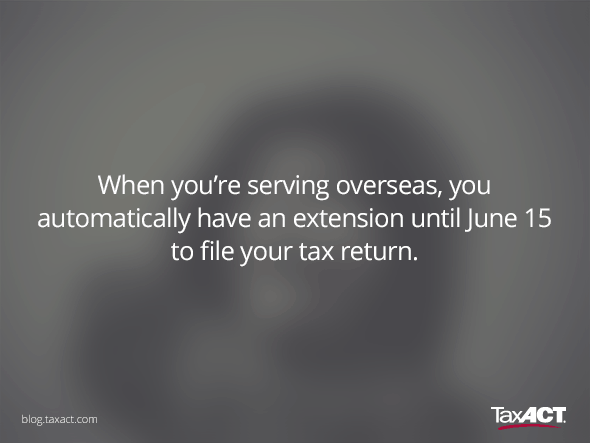As a member of the U.S. Armed Forces, you have special situations that may affect your tax return.
For instance, you may be able to take special deductions, and not all of your income may be taxable. In addition, you may have different state residency rules.
When you use TaxAct as a member of the armed forces, we make sure you get the tax breaks you deserve.
Here are some things you should be aware of when doing your taxes:
Some military pay and benefits are not taxable
Members of the Armed Forces pay income tax on basic pay, including training and active duty pay, special and bonus pay, and incentive pay.
They also pay tax on student loan repayment from certain programs.
You may receive significant pay and benefits, however, on which you don’t have to pay tax. Combat pay is not taxable.
Living allowances (BHA and BAS), which can be a significant part of your compensation package, are not taxable.
You also do not have to pay tax on group-term life insurance, uniform allowances, moving and travel allowances, professional education, family allowances, or death allowances.
As an Armed Forces reservist, you can also deduct travel and lodging expenses
Anytime you travel more than 100 miles and stay overnight as a National Guard member or Armed Forces reservist, save your receipts.
You can deduct the amounts you spent for work-related travel and lodging plus 50% of the cost of your meals.
Your food and lodging expenses cannot exceed the federal per diem rate for lodging and meals.
You can take this deduction even if you do not itemize your deductions.

You may have more time to file your return
When you’re serving overseas, you automatically have an extension of time to file your tax return.
You don’t even have to file an extension form to qualify. This automatic extension for troops serving overseas gives you until June 15 to file.
If you’re serving in a combat zone, you have more time.
The IRS allows you 180 days from the date you return from the combat zone, or 180 days from your last date of continuous hospitalization for injuries received while serving in a combat zone.
These 180 days are in addition to the number of days you had left to file the return when you entered the combat zone.
Even better, you won’t accrue interest or penalties during this extension.
You may be able to deduct military uniform expenses
If you pay for uniforms you cannot wear when you are off duty, you can deduct their cost.
You can also deduct the amounts you spend to clean and maintain them.
Any excess military moving expenses are deductible
The military generally pays your basic moving expenses when you are in service.
However, you may have some moving expenses you pay yourself. You can deduct moving expenses for which you are not reimbursed, even if you don’t pass the distance test or the 39-weeks of work test.
You and your spouse can keep your old residency state
You don’t have to change state residency for tax purposes when you are stationed elsewhere as a member of the military.
This is true for you, as well as for your spouse.
This means that if you and your spouse live in a state with income tax, but you still have state residency in your old state, the new state generally can’t tax either of your incomes.
If your employer withheld state taxes, you may need to file a nonresident return with that state to get a refund.
You’ll then file a resident return with your home state, if that state has an income tax, to report the income.





